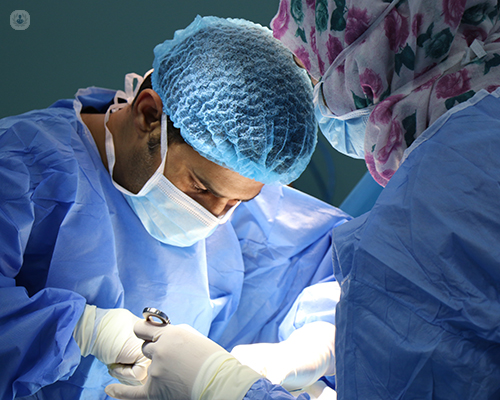An introduction to chronic liver disease and liver transplantation
Written by:Damage to the liver can result in symptoms of jaundice, fatigue, weakness and sometimes liver failure. Liver transplant surgery is essential for treating liver failure. Mr Andreas Prachalias, a top surgeon, discusses what liver disease is and how liver transplant surgery works.

What are the symptoms of liver damage?
The liver bears the brunt of detoxifying everything we need and do not need in our bodies to be able to function properly. Therefore, when the liver malfunctions, eventually, every system in the human body malfunctions too.
There are classical symptoms that are associated with liver damage. The most common of these is the yellowing of the skin and the sclera of our eyes. This is called jaundice.
As the degree of the liver disease progresses, the liver which is smooth and soft in our abdomen becomes hard and the blood that needs to go through the liver finds significant resistance. That can lead to the build up of fluid in the abdomen which sometimes can be quite significant – we call these ascites. One of the most severe complications of chronic liver disease is the eruption of one of these inside the gastrointestinal tract which can result in an internal haemorrhage.
Fluid can also accumulate in the ankles and it is not uncommon for patients to experience alterations in their sleep pattern or their degree of concentration, a condition that we call hepatic encephalopathy. The extreme manifestation of this condition is what we call hepatic coma.
All patients with chronic liver disease will experience fatigue and weakness where they struggle to function normally.
However, the symptoms experienced with liver disease do depend on etiology of the liver disease. These universal symptoms can sometimes be accompanied by symptoms related to the specific cause of liver disease.
Discover how alcohol can damage the liver
What is a liver biopsy for?
A liver biopsy is a small interventional procedure by which we take a small piece from the liver in order to examine it under the microscope. By doing so, we are able to assess the nature of the liver damage and the degree of liver damage present.
A liver biopsy is performed most commonly by a radiologist through a small cut in the patient’s abdomen. A needle is inserted which removes a small cylinder of liver tissue for examination under the microscope.
What happens during liver transplant surgery?
Liver transplant surgery is the final and most effective treatment for patients with chronic liver disease. When a patient’s chronic liver disease has progressed beyond a certain state and beyond resolution, the liver must be removed and replaced by a new, healthy liver. A new liver most commonly comes from a deceased organ donor, or less frequently, by a close member of the family. In the latter liver transplants, a part of the family member’s liver is removed which is then transplanted.
During surgery, all of the diseased liver is removed and replaced with a healthy graft. This is a very complex operation which involves removing the old liver in a hostile surgical environment, characterised by thin, large vessels formed as a result of chronic liver disease.
When is a liver transplant needed?
Most patients with liver disease are able to maintain use of their own liver if they follow a careful management plan and follow instructions from their doctor. There are, however, cases where all medical treatments have failed to stop the progress of liver disease. In such cases, the liver becomes progressively smaller, stiffer and harder. The patient will start to experience the complications of chronic liver disease and ultimately liver failure. When a patient reaches this point, then survival is based on the success of a liver transplant.
What complications are there with liver transplant surgery?
It is important to understand that liver transplantation is a highly complex surgery. It has been said that perhaps liver transplantation is the most complex operation ever invented. However, since its inception in the 60s, we have come a long way. Today, liver transplants can be performed safely in highly experienced centres by highly experienced surgeons with results and outcomes that are considered to be exceptional.
However, problems can arise from the fact that a diseased liver – with complex enlarged and thin vessels – presents a challenging surgical environment, even for the best surgeons. In addition, often the kidneys, heart and lungs might not also be in the best shape in patients with liver failure and chronic liver disease. Therefore, the risk of blood clots can be high in such patients, presenting a further challenge for liver surgery.
Another huge risk factor is the fact that a foreign object (a new liver) is being transplanted, and the complications that can arise from this alone, such as organ rejection, are hugely complex.
If you would like to find out more, make an appointment with a specialist.


